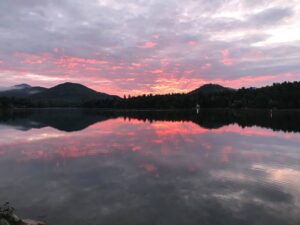The Most Wonderful Christmas Ever! v2
The Most Wonderfullest Christmas Ever
I have celebrated and enjoyed many Christmases over my three score and ten plus years. Some of the very best involved watching my children dash down the stairs to see what Santa had placed beneath the tree. Another favorite occurred a few days before Christmas when Polley flew out from St. Louis to spend time with me and my family before she returned to be with hers for the holiday. We took the bus to New York City, ate at the Top of the Sixes, a revolving restaurant atop one of Manhattan’s sleek steel buildings, and huddled in the same spot Cary Grant and Deborah Kerr stood in An Affair to Remember on the top of the Empire State Building, our breaths mingling in the chilly December air. As we walked home from the bus stop, I watched the snowflakes lace her eyelashes and I knew that Christmas had come early; I knew I already had my gift that year, a gift I still treasure every day. 
All those Christmases were special but there is one that I am constantly revisiting in my daydreams and in my soul’s recounting. Let me tell you about it. But before I do, I must warn you. You have to believe in magic in order to understand this story. Not the magic of a Dave Copperfield, or a Houdini or a David Blaine, fine magicians all. I refer to the magic borne of childhood wonder, the unexplainable occurrences that make a child believe in a world, in a universe, that is excitingly mysterious and which is supported by a fundamental goodness, a world in which faith supercedes cynicism.
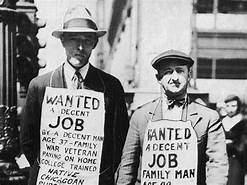
My parents were products of the Great Depression, a time of utter uncertainty and a period where harsh realities made hope a struggle. My mother’s mother died in the Great Spanish Flu epidemic when my mother was five or six, and my father joined the Civilian Conservation Corps to help support his family. Christmas day for both my folks was just another day in the struggle to survive. When my father returned from World War II, he married my mother who later gave birth to me, and, four years later, to my brother Jimmy. We lived in the Bronx until I was about nine or ten and then, my parents seeking a home in an environment where they could open the front door on a Saturday and let their kids disappear into a safe exploration of childhood, moved to a quiet suburb in New Jersey.
So confident that the world they provided us was secure and free from danger, that even at that young age I was allowed to take the bus by myself up to Union City and West New York. I would stroll up and down Bergenline Boulevard to see what Christmas gifts I could purchase with the few dollars I made in after school jobs and with the fifty cents allowance I received for completing family chores.
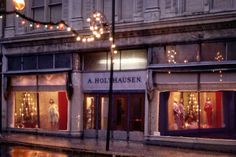
There was a magic that I inhaled with every breath as I stopped at various store windows, comparing prices of gifts to the small stash I harbored in my pocket. And it was the magic of anticipation, highlighted by the holiday music pouring out of various venues, from Perry Como to Alvin and the Chipmunks that lightened my spirit. And it was not just the magic of anticipation of what was to be received, but of what was to be given. The days before Christmas were filled with the delight in expectation of the smiles I would draw on the faces of my mother and my father and my younger brother Jimmy. Wouldn’t Mom gasp as she unwrapped the faux leather purse I chose? Wouldn’t Dad’s jaw drop as he opened the package containing the fishing lures, the red and white Daredevils I picked out? Wouldn’t Jimmy squeal in glee as he tore off the wrapping paper from his cork pop gun?
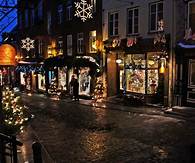
Anticipation is ninety percent of the holiday. Christmas morning Jimmy and I, tossing and turning in our beds, would wait and wait and wait until we heard our parents call to us to come downstairs. In our pajamas we would race to the tree, a spruce or pine aglow with twinkling lights and ornaments and tinsel, examine the colorful packages and pick the ones tagged with our names. As we unwrapped, we would smell the rich odor of coffee percolating and bacon and home fries sizzling and hot chocolate brewing. It was a day of exclamations of surprise, some false, some true, and a day of play and warmth.
But this one Christmas, things were different. Very different. Later, much later, I realized that my parents, survivors of the depression and the war, distrusted happiness. You were supposed to make the most out of a bad deal, and the bad deal was a harsh reality that blocked out every other truth. Not having been loved as they loved Jimmy and me, they found it difficult to be secure in the feelings they had for each other. So one night a couple of days before Christmas, my father came home late. Very late.
“You were supposed to take me Christmas shopping!” My mother stood in the kitchen, hands on hips, body vertically braced.
My father took off his navy peacoat. “I had to visit my mother.”
My grandmother lived in the Bronx, and she would often call on her sons to drive out to her apartment to unclog a sink or translate a bill she did not believe she incurred or fix some household device. She did not like my mother. Her culture believed orphans did not make good spouses.
“You took her shopping!!! What about shopping for your own kids?!”

Boy covering ears with hands while his parents arguing in the background
And the fight was on. Jimmy and I huddled on the top steps of our stairs and listened to the accusations and recriminations, a litany of offences committed over what seemed like centuries of their mutual past. They yelled and yelled some more, and each cry a dagger to our psyches. Jimmy and I shrank with each threat and counter threat. We crawled off to our separate beds and covered our heads with our blankets. I heard Jimmy crying.
The next morning we tentatively came downstairs. My mother sat at the kitchen table reading the newspaper and sipping coffee. When she heard us, she got up and filled two bowls with farina. My father had already gone to work. We had no school, and that was worse because school would have made the time go faster and help us forget that Christmas was not to be that year. The radio was taunting us with “We Wish You a Merry Christmas.” We half-heartedly played with our toys that day. I read my biography of Jim Bowie.
My parents did not speak at all to each other that evening nor the next day, Christmas Eve. Dinner Christmas Eve was lentil soup which I hated. Jimmy and I tried to stay clear of both our parents because we knew that intense silence, that ocean of quiet hostility between the two of them, was deafening to us. Jimmy and I walked into the garage and there, leaning in the corner, was a fraser fir my father brought back from one of his hunting trips. Jimmy grabbed my hand. 
The tree would not stand decorated and lit in our living room this year. Nor would there be gifts under it. We had long ago discovered our parents’ best hiding places, and those places stood bare. No Christmas breakfast, no Christmas dinner, and no Christmas laughter. The house felt empty.
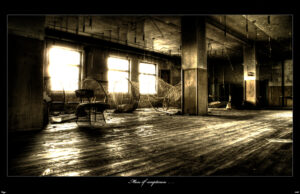
At least I had my gift for my brother. And what to do with the gifts I already bought for my Mom and Dad?
My parents were still not speaking when Jimmy and I trudged up to bed. The radio was playing “Silent Night,” and we both covered our ears as we crawled under our blankets. I lay staring at the ceiling and thinking about what I had done so wrong that this non-Christmas came to be. What should I have done to make my parents happy? Why wasn’t I a good person? You know. Kids blame themselves for the state of the world.
I heard Jimmy sniffling in his bed. I called to him, “You wanna crawl in next to me?”
He stifled a sob. Paused a bit. “Yes.”
Jimmy slid in next to me. I put my arm around his shoulder. “It’s okay, Jimmy. It’s okay.”
He buried his head in my shoulder and whimpered. “It’s Christmas. But it’s not.” I looked out our window at the dark blue night sky and dreaded Christmas day. Somehow we both drifted off into a dreamless sleep.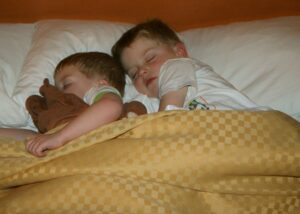
The first thing I remember about that Christmas morning was a bright ray of December sunshine warming my cheek. My brother still lay next to me.
A wave of smells teased my nostrils. There was the earthy smell of coffee, but there were other odors that I recognized but should not have been there considering the circumstances. I heard “Sleigh Ride” blaring on the radio downstairs.
“Jimmy!! Jimmy!! Get up!”
Jimmy pulled the blanket over his head. “I don’t want to get up.”
“We have to get up sometime. Come on!”
Then, from downstairs, we heard our father’s voice. It was the first full sentence we had heard from him in days. “Hey, you two. Get up and come down here. It’s Christmas.”
Jimmy and I looked at each other. Tentatively we walked to the top of the stairs and leaned over.
There, at the bottom of the staircase stood my mother and my father, his arm wrapped around her waist, smiles adorning both faces, both pairs of eyes twinkling. We could see in the living room the fraser fir upright and festooned with red, green, blue and white blinking lights and ornaments galore and, of course, tinsel. Somehow during the night my parents had reconciled. It was pure magic. The radio played “Hark the Herald Angels Sing.”
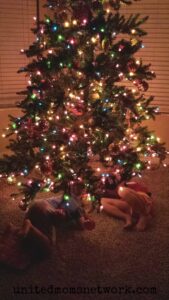
My brother and I raced down the stairs, Jimmy wrapping his arms around my mother’s thighs. My father put his hand on my shoulder.
“Let’s have breakfast. We have eggs, Italian sausage, hot chocolate and”
My brother interrupted, “With marshmallows?”
“Of course, with marshmallows.”
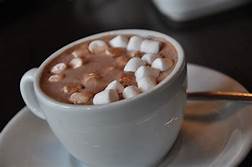
I sat down at the kitchen table, and, hard as I tried to prevent them, tears formed in the corners of my eyes.
My dad plopped down a heap of home fries on my plate. “After breakfast we’ll all play some Scrabble.” He looked at me. “And after that, maybe Monopoly.” He knew that was my favorite game. “And a few rounds of NAVY.” NAVY was fhe forerunnner of the popular game Battleship, only played with paper and pencil.
My mother dropped a few marshmallows on Jimmy’s hot chocolate. “And your father says that since we didn’t have time to get a ham or turkey for Christmas dinner…” she shot my dad that dagger glance that most mothers develop and which could stop a charging rhino at five paces…”We are all going to Chinatown for dinner!” Wow! On special occasions my father would take us to a Chinese restaurant where he could feed the whole family on good food for ten bucks.
There were no presents under the tree. That day, there did not need to be. The magic sufficed. As my brother Jimmy formed a brown moustache on his upper lip courtesy of his hot chocolate, he exclaimed, “This is the most wonderfullest Christmas ever!” For me it was and still is.
Happy Holidays 
https://blog.ralphmaltese.com/2020/12/16/the-most-wonderf…t-christmas-ever/
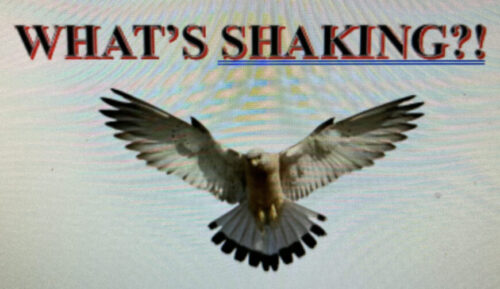



 We’ll killing the planet so a few greedy people can become even richer, Violence and crime are up. Kids are getting stupidly high on drugs and killing each other.”
We’ll killing the planet so a few greedy people can become even richer, Violence and crime are up. Kids are getting stupidly high on drugs and killing each other.”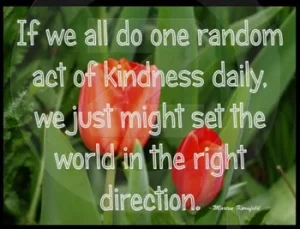
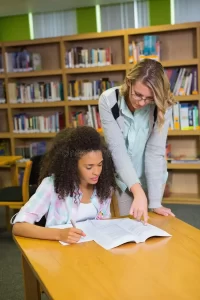

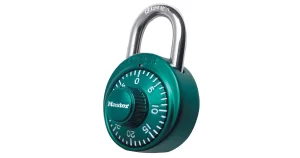


 you will not find the goodness of the world in the headlines or on the evening news. What we hear nightly are the bad things. Serial killings, demolishing storms, bankruptcies, corrupt politicians. Why the emphasis on evil? Because bad happenings sell. Bad news is big business. Many people thrive on hearing bad news, perhaps, just perhaps, because they survive their own plights by vicariously experiencing some other poor life form’s misfortune.
you will not find the goodness of the world in the headlines or on the evening news. What we hear nightly are the bad things. Serial killings, demolishing storms, bankruptcies, corrupt politicians. Why the emphasis on evil? Because bad happenings sell. Bad news is big business. Many people thrive on hearing bad news, perhaps, just perhaps, because they survive their own plights by vicariously experiencing some other poor life form’s misfortune.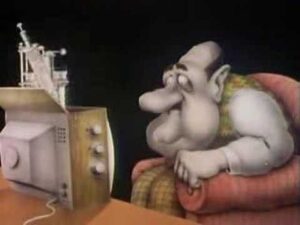 In any case, don’t expect to hear on national television: “Breaking news: Tomorrow will be a beautiful day, with mild temperatures and sunshine!” Or, “A family in Idaho helped a family from Tucson move into their new home.” OR Senator NiceGuy told the truth at a hearing.” Or “RV resurrected Ralph’s blog website.”
In any case, don’t expect to hear on national television: “Breaking news: Tomorrow will be a beautiful day, with mild temperatures and sunshine!” Or, “A family in Idaho helped a family from Tucson move into their new home.” OR Senator NiceGuy told the truth at a hearing.” Or “RV resurrected Ralph’s blog website.”

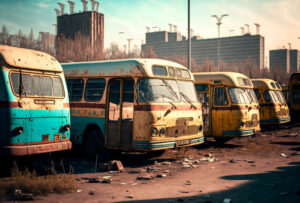 and cough-splattered dirty white opaque windows that masked the riders, to lakes which so clearly mirrored the surrounding mountains and trees that one became disoriented as to which was real and which was the reflection.
and cough-splattered dirty white opaque windows that masked the riders, to lakes which so clearly mirrored the surrounding mountains and trees that one became disoriented as to which was real and which was the reflection.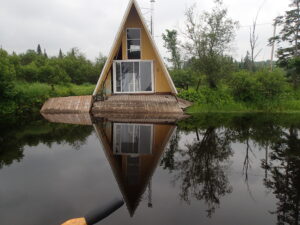
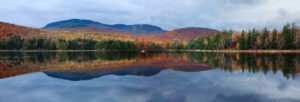 Even though Tupper Lake did not have the entertainment gravitas of Saranac Lake or the panache of Lake Placid, we enjoyed shopping in the IGA and having a breakfast of eggs, pancakes, hash browns, and corn beef hash at the Lumberjack restaurant.
Even though Tupper Lake did not have the entertainment gravitas of Saranac Lake or the panache of Lake Placid, we enjoyed shopping in the IGA and having a breakfast of eggs, pancakes, hash browns, and corn beef hash at the Lumberjack restaurant. 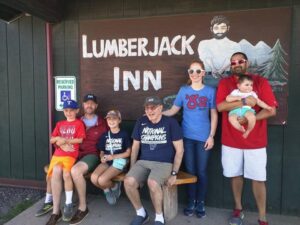 The locals were kind and helpful and pleasant in conversation. My brother Jimmy and I would swim in Little Wolf Pond and catch bullheads in the evening. Most of all, we inhaled the cool, crisp air that convinced me that I could overcome any challenge, any obstacle, any taunt hurled in my direction. If the air inspired my spirit, the green mountains thick with pine trees and cradling the deep, dark blue lakes and ponds, calmed my soul. The sky always seemed to be an ocean painted a Madonna blue, and puffy ivory white clouds always sailed that water. The big plus over Saranac Lake and Lake Placid was my father’s ability to afford staying in Tupper Lake.
The locals were kind and helpful and pleasant in conversation. My brother Jimmy and I would swim in Little Wolf Pond and catch bullheads in the evening. Most of all, we inhaled the cool, crisp air that convinced me that I could overcome any challenge, any obstacle, any taunt hurled in my direction. If the air inspired my spirit, the green mountains thick with pine trees and cradling the deep, dark blue lakes and ponds, calmed my soul. The sky always seemed to be an ocean painted a Madonna blue, and puffy ivory white clouds always sailed that water. The big plus over Saranac Lake and Lake Placid was my father’s ability to afford staying in Tupper Lake.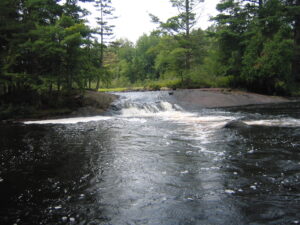 He would rent a rustic cabin, usually one that looked like it was built with Lincoln Logs, with a small kitchenette so we could cook our meals. Our favorite rental was a three room (two bedrooms and a kitchen/living/dining room) white Cape Cod-like cabin with bright red shutters; a cabin nestled in a grove of white birch trees on Little Wolf Pond. Often the centerpieces of these meals were the fish we caught from our usual fishing spots, one of which was located on the Raquette River at the Settin’ Pole Dam.
He would rent a rustic cabin, usually one that looked like it was built with Lincoln Logs, with a small kitchenette so we could cook our meals. Our favorite rental was a three room (two bedrooms and a kitchen/living/dining room) white Cape Cod-like cabin with bright red shutters; a cabin nestled in a grove of white birch trees on Little Wolf Pond. Often the centerpieces of these meals were the fish we caught from our usual fishing spots, one of which was located on the Raquette River at the Settin’ Pole Dam. 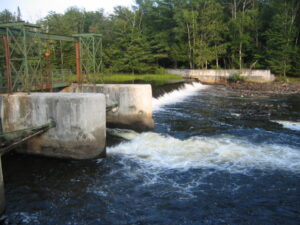 The dam had three huge, whitish gray, concrete pillars that held the gates which controlled the flow of water into the river below. We climbed over the railing and strolled, fishing rod in hand, down the metal walkway to the middle pillar and cast into the white foaming water that gushed beneath us.
The dam had three huge, whitish gray, concrete pillars that held the gates which controlled the flow of water into the river below. We climbed over the railing and strolled, fishing rod in hand, down the metal walkway to the middle pillar and cast into the white foaming water that gushed beneath us. 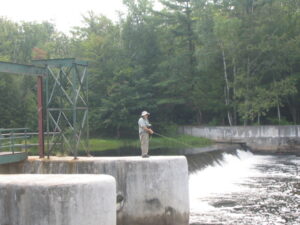



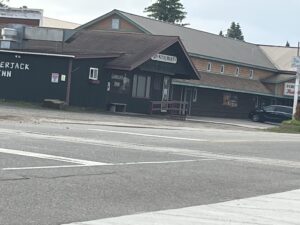
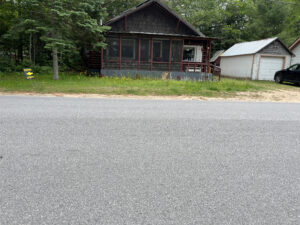
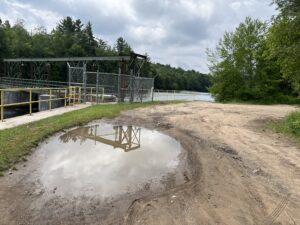 I felt that same fence around my heart. I stared for a long while at the dam, the river, and the sky.
I felt that same fence around my heart. I stared for a long while at the dam, the river, and the sky. I can picture movements and facial expressions, smiles and frowns and laughs. I can think the memory. But visiting the past in space is not sufficient. Something is missing. I cannot feel the memory. I cannot feel in my body and soul the joys of my youth.
I can picture movements and facial expressions, smiles and frowns and laughs. I can think the memory. But visiting the past in space is not sufficient. Something is missing. I cannot feel the memory. I cannot feel in my body and soul the joys of my youth.